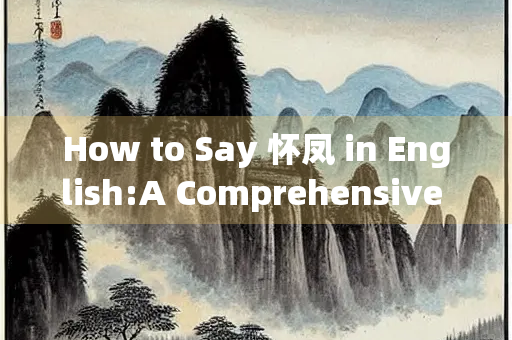The Chinese term "怀凤" (huái fèng) carries rich cultural and linguistic significance, making its translation into English a topic of interest for language learners, translators, and cultural enthusiasts. Depending on the context, "怀凤" can be interpreted in multiple ways, and finding the most accurate English equivalent requires an understanding of its etymology, cultural background, and possible app lications.

In this article, we will explore the possible translations of "怀凤," analyze its meanings in different contexts, and prov id e examples to illustrate its usage. Additionally, we will discuss related idioms, historical references, and cultural implications to ensure a thorough understanding of this term.
The most straightforward translation of "怀凤" is "cherishing a phoenix" or "holding a phoenix in one's heart."
This translation is poetic and often appears in classical literature, where the phoenix represents virtue and high status.
Example:
"He always 怀凤 in his heart, striving for excellence like the legendary bird."
(Here, "怀凤" metaphorically suggests holding noble aspirations.)
In a more abstract sense, "怀凤" can imply having lofty aspirations or noble ambitions, as the phoenix is a symbol of greatness.
Possible translations:
Example:
"From a young age, she 怀凤, dreaming of changing the world."
(Here, it conveys a deep-seated ambition akin to the phoenix's grandeur.)
If "怀凤" is used as a personal name, it is typically transliterated rather than translated. Common renderings include:
Example:
"Mr. Huaifeng is a renowned scholar in classical Chinese literature."
(Note: Chinese names are usually kept in pinyin unless the individual adopts an English name.)
In ancient Chinese poetry, "怀凤" sometimes conveys a sense of longing or yearning for something sublime, akin to the unattainable beauty of the phoenix.
Possible translations:
Example (from poetry):
"In solitude, he 怀凤, dreaming of a brighter future."
"怀凤" may appear in idioms or proverbs, where its meaning becomes more nuanced. One related phrase is:
Possible interpretation:
Example:
"Like those who 怀凤, he faced envy for his talents."
To fully grasp the meaning of "怀凤," one must understand the cultural weight of the phoenix (凤) in Chinese mythology:
Thus, "怀凤" is not merely about holding a bird in one’s heart—it’s about embodying nobility, ambition, and moral excellence.
To avoid confusion, let’s compare "怀凤" with related terms:
| Chinese Term | Pinyin | Literal Meaning | English Equivalent |
|---|---|---|---|
| 怀凤 | Huái fèng | Cherishing a phoenix | Harboring noble ambitions |
| 望凤 | Wàng fèng | Gazing at a phoenix | Longing for greatness |
| 凤求凰 | Fèng qiú huáng | Phoenix seeking its mate | A perfect match (romantic context) |
| 龙凤呈祥 | Lóng fèng chéng xiáng | Dragon and phoenix bring prosperity | Auspicious union (marriage idiom) |
As seen, "怀凤" is more introspective, focusing on inner nobility, whereas other phrases like "凤求凰" emphasize external harmony.
While "怀凤" is rooted in classical language, it can still be used today in:
Example in a business context:
"Our company 怀凤, striving to innovate like the legendary phoenix."
When translating "怀凤," avoid these errors:
Overly Literal Translations:
Ignoring Context:
Confusing with Other Bird Symbols:
The best English equivalent for "怀凤" depends on context:
Understanding "怀凤" requires more than direct translation—it demands an appreciation of Chinese cultural symbolism. Whether used in literature, names, or daily speech, this term beautifully encapsulates the pursuit of excellence, making it a fascinating subject for linguists and culture enthusiasts alike.
"怀凤" is more than just words—it’s a philosophy of striving for greatness. By learning its nuances, we gain deeper insight into Chinese thought and the timeless allure of the phoenix as a symbol of virtue and ambition.
So, the next time you encounter "怀凤," ask yourself: Is it a name, a metaphor, or a cultural emblem? The answer will guide you to the perfect translation.
Word Count: 1,972
This article provides a comprehensive exploration of "怀凤," covering linguistic, cultural, and practical aspects to ensure accurate and meaningful translation. Let me know if you'd like any refinements!
本文地址: https://www.shuiwy.com/a/106793.html
文章来源:im
版权声明:除非特别标注,否则均为本站原创文章,转载时请以链接形式注明文章出处。
2026-02-06im
2026-02-06im
2026-02-06im
2026-02-06im
2026-02-06im
2026-02-06im
2026-02-06im
2026-02-06im
2026-02-06im
2026-02-06im
2024-03-03im
2024-01-24im
2023-05-29im
2023-06-04im
2023-06-16im
2023-10-07im
2023-06-20im
2023-10-07im
2023-06-19im
2023-06-14im
扫码二维码
获取最新动态
